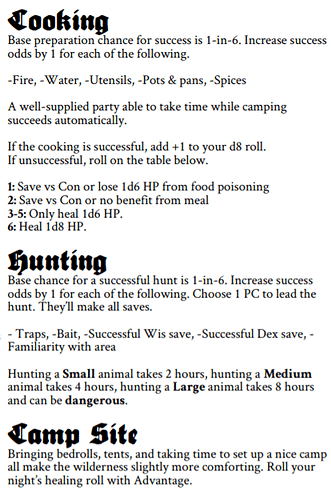In my last session, all my players failed their checks to fish and forage in the same hour. Admittedly I didn’t prepare for them to try, so I basically offered to fast forward to the next morning since they had already set up camp, and that they could just eat their rations.
This was unsatisfying even for me, so I came up with a quick system that’s more engaging where they roll 2d6 and add their ability bonus. If they roll over 9 (basically 5-out-of-12 times), they succeed. If they roll over 6 (5-out-of-6 times), they fail but still get something out of the activity. Anything less, and something bad happens.
I wanted to compare to other people’s systems, and saw that someone said that for things like fishing, they don’t bother rolling since their characters are assumed to be competent enough. I didn’t think this principle would apply here! Though, it would feel weird to roll for some activities (eg. foraging) and not others (eg. fishing). Then, the only thing stopping someone from fishing over foraging would be a body of water, or the risk of overusing their fishing pole.
What do y’all think? Has this come up in any of your games? Ideally I want this to be pretty gamey, almost like a fishing minigame, since that’s the vibe I’m going for in my own campaign.


